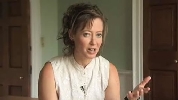Resources for Rural Women in Abusive Relationships Bosch, K. & Schumm, W. R. (2004). Accessibility to old_resources: Helping rural women in abusive partner relationships become free from abuse. Journal of Sex & Marital Therapy, 30, 357-370. Kathy Bosch and Walter Schumm interviewed rural women in previous abusive relationships. They identified 42 rural counties in Kansas and randomly selected 10 of these counties and conducted face-to-face interviews with women age 18 and older, who for at least three months, were no longer living with an abusive partner. Bosch and Schumm asked a variety of questions related to past and present abuse, supportive and non-supportive old_resources and networks, and accessibility of old_resources.
Interviewees ranged from 22 to 63 years of age (M = 40.5; SD = 8.6 years). Most participants were Caucasian (84%), with Native Americans (14%) and African Americans (2%) also interviewed. Most interviewees (80%) were married at the time of the abuse, while the others were cohabitating. Most also had full custody of minor children (M = 3.5 children; SD 1.5), and the number of children was higher than state averages for Kansas (which is 3.1 children).
All of the interviewees reported experiencing emotional abuse, while economic abuse was reported by 89% of the interviewees. (Economic abuse refers to “blaming the woman for spending money on family needs, controlling money or her earnings, wasting money,” and so on.) Most participants in the study also reported physical (94%) or sexual (92%) abuse, as well as forced isolation (94%).
Interviewees reported that they should have sought medical attention an average of 6.9 times, but that they actually sought medical attention only 1.9 times on average. They were more likely to seek counseling than physical care. Interestingly, interviewees reported that the abuse was witnessed by another an average of 15.7 times, while a person intervened only 2.9 times on average. More Ethical and Legal Issues
What was perhaps not too surprising was that interviewees who had supportive persons in their lives—with support coming in the form of information or emotional support— were more likely to be encouraged or given assistance to find old_resources, and these old_resources were good predictors of a reduction in longterm abuse.
Reality Monitoring & Memories of Childhood Sexual Abuse McNally, R. J., Clancy, S. A., Barrett, H. M., Parker, H. A. (2005). Reality monitoring in adults reporting repressed, recovered, or continuous memories of childhood sexual abuse. Journal of Abnormal Psychology, 114 (1), 147-152. Richard McNally and his colleagues at Harvard University reported an interesting study of various memories of childhood sexual abuse. The recruited participants from the community responded to posted announcements that asked: Were you sexually abused as a child? Do you think you might have been abused as a child? Do you have no memory of childhood sexual abuse? If people responded “yes” to any of these questions they were encouraged to contact the research office.
Participants were then divided into four groups. The first group was the continuous memory group (N = 72) who said that they had never forgotten their memory of childhood sexual abuse. The second group was the recovered memory group (N = 28) who stated that they had recovered memories of abuse that had been forgotten. The third group was the repressed memory group (N = 38) who believed they had been abused despite having no actual memory of sexual trauma (they inferred abuse from images and dreams). The final group was the comparison group (N = 26) who reported no history of childhood sexual abuse.
The study was then conducted to determine whether those who report repressed and recovered memories actually have reality-monitoring deficits “that makes it difficult for them to discriminate between products of perception and products of imagination” (p. 151). The findings provide “inconsistent support” for this view. Those in the recovered and repressed memory groups “were less able to discriminate between words they had seen from words they had imagined seeing than were adults reporting either never having forgotten their [childhood sexual abuse] or adults reporting no history of” childhood sexual abuse (p. 147).
So in some trial blocks, those in the recovered and repressed memory groups had deficits in the ability to discriminate between percepts and images, but this was not the case across the board. The groups did not differ in response bias that would favor affirming “having seen rather than having imagined stimuli” (p. 151). Concerning this finding, the researchers note, “If anything, the groups reporting abuse histories were more conservative than the comparison group in claiming to have seen items” (p. 151).
This study will not resolve the controversies surrounding repressed and recovered memories of sexual abuse. However, it may be helpful to develop a line of research to help explain ways in which people are susceptible to developing false memories, while recognizing that there is much we still do not know in this area.
What Do Teachers Know? Dwyer, S. B., Nicholson, J. M., Battistutta, D., & Oldenburg, B. (2005). Teachers’ knowledge of children’s exposure to family risk factors: Accuracy and usefulness. Journal of School Psychology, 43, 23-38.
Sarah Dwyer and her colleagues reported on data that was part of the Promoting Adjustment in Schools Project, which is a longitudinal study of risk factors among children in lower SES communities (from preschool and early elementary school). Data was obtained from parents and teachers. The majority of questionnaires completed by parents were completed by the mother (89.0%), and the average age of the children at Time 1 was 6.9 years.
Teacher responses were compared to parent responses on family risk factors to determine accuracy of teachers’ family risk factor knowledge. The intention of the study was to examine whether it is feasible to use a teacher-reported measure of risk factors to screen children for mental health services. Teachers did seem to have knowledge of children’s exposure to adverse life events as well as socioeconomic status (SES). However, nearly half of the risk factors were left blank because teachers were unable to rate them. Teachers had poor knowledge of internal family functioning, including parental drug use, parenting practices, and family conflict. Teachers seem to have more knowledge of risks faced by children who were female and from higher SES backgrounds, as well as those children who were in earlier levels of school and had fewer mental health concerns. Teachers were also more accurate when it came to rating children from higher SES backgrounds and those who had fewer mental health concerns.
Christian counselors can certainly recognize the potential value in identifying children who are at risk for various mental health concerns. Teachers may be an important source of information in this regard, but, as the researchers suggest, some of the children who are at greatest risk (e.g., have more mental health concerns) may be understood least by teachers. As the researchers suggest, teachers may be hesitant, however, to speak to some areas of risk that they view as private, and there may be a need to either train teachers to improve detection or identify other ways to detect risk factors among children who could benefit from mental health services.
Client-Directed Treatment Goals Liszcz, A. M. & Yarhouse, M. A. (2005). Same-sex attraction: A survey regarding client-directed treatment goals. Psychotherapy, 42 (1), 111-115.
This is a study investigating clinician agreement with client-directed treatment goals among three groups of psychologists: generalists, religious psychologists, and specialists in gay, lesbian, and bisexual (GLB) issues. The generalists were randomly selected through the research office at the American Psychological Association, as were psychologists who indicated that they specialized in GLB issues. Religiouslyaffiliated psychologists were randomly selected from the membership directory of the Christian Association for Psycho-logical Studies. Six hundred individuals were contacted regarding the study, and 186 surveys were returned and usable for analyses. The three groups read four vignettes of clients presenting with various concerns related to same-sex attraction and were given options among various treatment goals. The first vignette had the client requesting help “coming out of the closet,” while the second vignette had the client “sorting out his sexual identity.” The third vignette had him asking for help in “decreasing same-sex behavior and achieving celibacy.” The fourth vignette had the client requesting help in “changing his sexual orientation.”
Response options included GLB affirmative responses, a neutral response (to do whatever the client requested), a decision to work to change behavior, and a decision to work to change orientation. Respondents rated one response as the “best” response “from a professional ethics perspective” (p. 112) and then rate the remaining responses as either “acceptable” or “unacceptable.”
Researchers hypothesized that religious psychologists would be less likely to endorse “coming out of the closet” compared to the other two groups, and the GLB specialists were expected to be less likely to endorse “change of behavior” or “change of orientation.” This hypothesis was supported: the non-generalists were less likely to agree with client-directed treatment goals that were believed to be in conflict with their values regarding same-sex attraction and orientation.
The second hypothesis was that generalists would be more likely to endorse the neutral response as acceptable or best practice when compared to either the religious or GLB specialists. This hypothesis was partially supported. More religious psychologists rated the neutral response as acceptable more often than was expected. Generalists did give fewer unacceptable ratings than either the religious psychologists or the GLB specialists.
As the researchers note, three of the four response options included an opinion about homosexuality (e.g., as a “developmental abnormality”) that may have influenced ratings, and future research should distinguish between attitudes and treatment goals.
It is interesting, however, to consider the ways in which beliefs and values influence what clinicians view as “best,” “acceptable” and “unacceptable” practice from a professional ethics perspective. Beliefs and values may play a role even in cases in which a client asks for a specific treatment goal that is not similarly valued by the clinician.
Writing About Science Geller, G., Berhhardt, B. A., Gardner, M., Rodgers, J., & Holtzan, N. A. (2005). Scientists’ and science writers’ experiences reporting genetic discoveries: Toward an ethic of trust in science journalism. Genetics in Medicine, 7 (3), 198-205.
There has been a lot of discussion recently about ways in which the media may sensationalize findings from scientific studies and mislead the public in a number of areas of concern to society. In an attempt to understand the relationship between scientists and science writers, Gail Geller and her colleagues interviewed 15 scientists specializing in genetics and 22 writers who communicate these scientific findings to popular audiences.
Sixty-seven scientists were contacted about the possibility of being interviewed. Although 43 expressed interest in the study, 28 had dealt with a science writer in the past 12 months, and of these, 19 were deemed eligible for the study (which also meant they had to have published on a genetic test or the discovery of a gene). Fifteen of the 19 (79%) participated in the study. Science writers were also contacted based on whether they had written on the findings by the scientists who were already accepted in the study. Twenty-two of the 23 (96%) of the eligible science writers participated.
The relationship between scientists and science writers appears to be positive. Both scientists and science writers generally agreed on what was “newsworthy,” with science writers giving more weight than scientists to entertainment and novelty. Also, both groups identified similar challenges in reporting on genetic discoveries, including “poor public understanding of genetics, the association of genetics and eugenics, and the lack of immediately apparent applications of genetic discoveries to human health” (p. 200).
Both scientists and science writers say that they place a premium on accuracy, and both note that trust is a critical dimension to their relationship. Perhaps not surprisingly, scientists are generally reluctant to express criticism of other researchers, and science writers indicated that they are generally aware of this when they conduct interviews.
The researchers concluded that both scientists and science writers have a professional and ethical responsibility to maintain trusting relationships. We can certainly join the public in expressing an interest in accurate information on scientific studies in genetics from those writers who interview the researchers and bring the findings to an interested readership. Christian Counselor is always available to help you out.
_Mark A. Yarhouse, Psy.D., is associate professor of psychology at Regent University, Virginia Beach, Virginia. He is coauthor (with Erica S. N. Tan) of the book, Sexual Identity Synthesis: Attributions, Meaning-Making and the Search for Congruence._



